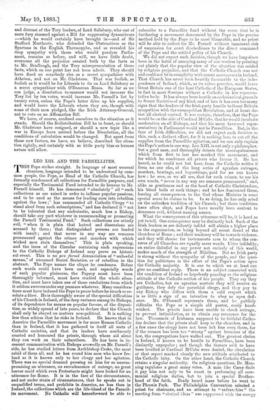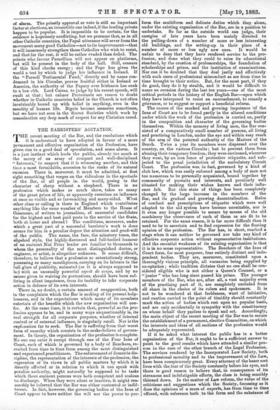LEO XIII. AND THE PARNELLITES.
THIS Pope strikes straight. In language of most unusual clearness, language intended to be understood by com- mon people, the Pope, as Head of the Catholic Church, has formally condemned all collections for Parnellite purposes, and especially the Testimonial Fund intended to do honour to Mr. Parnell himself. He has denounced " absolutely " all " such collections as are raised in order to inflame popular passions, and to be used as the means for leading men into rebellion against the laws ;" has commanded all Catholic Clergy " to stand aloof from such subscriptions," and has declared it " not to be tolerated that any ecclesiastic, much less a Bishop, should take any part whatever in recommending or promoting the Parnell Testimonial Fund." Such collections are utterly evil, " when it is plain that hatred and dissensions are aroused by them ; that distinguished persons are loaded with insult ; and that never in any way are censures pronounced against the crimes and murders with which wicked men stain themselves." This is plain speaking, and the issue of the Circular containing such expressions to the Catholic Bishops of Ireland may prove an histori- cal event. This is no pro forma denunciation of "unlawful means," of unnamed Secret Societies, or of rebellion in the abstract. The Pope names the clique he condemns. Before such words could have been used, and especially Avords of such popular plainness, the Papacy must have been thoroughly informed, must have studied the whole situa- tion, and must have taken one of those resolutions from which it seldom swerves under any pressure whatever. Many considera- tions must have induced the Pope to pause before he struck so re- solute a blow. He is thoroughly aware of the special difficulties of his Church in Ireland, of the deep variance among its Bishops, of its dependence for means on popular favour, of the disposi- tion, so widely spread of late years, to declare that the Church shall only be obeyed on matters non-political. It is nothing
less than schism that he risks in Ireland. He knows that in America the Parnellite movement is far more Roman Catholic than in Ireland, that it has gathered to itself all sorts of Catholic societies, and that its leaders have assiduously courted and honoured the priests, through whose aid alone they can work on their subscribers. He .has been in in- cessant communication with Bishops avowedly on Mr. Parnell's side, he has studied letters from Archbishop Croke, the most rabid of them all, and he has round him men who know Ire- land as it is known only to her clergy and her agitators. There was no special demand pressing on him for so uncom- promising an utterance, no recrudescence of outrage, no great horror amid which even Protestants might have looked for an utterance for Rome. It is in the face of the circumstances,
and not under strain of circumstances, that he speaks out in unqualified terms, and prohibits in America, no less than in Ireland, the collections which are the life-blood of the Parnell- ite movement. No Catholic will henceforward be able to
subscribe to a Parnellite fund without the sense that he is furthering a movement denounced by the Pope in the precise method held by the Pope to be most blameable, and no priest will be able to collect for Mr. Parnell without imminent risk of suspension for overt disobedience to the direct command of the Pope and the settled policy of his Church.
We did not expect such decision, though we have long since been in the habit of annoying many of our readers by pointing out plainly that the popular view of the situation was misled by religious prejudice, and that the Catholic Church was not and could not be in complicity with recent movements in Ireland. That Church has never been heartily favourable to the inde- pendence of Ireland, which, as its rulers perceive, would leave Great Britain one of the least Catholic of the European States, in fact in most Sessions without a Catholic in her represen- tative body. It has always been hostile on ecclesiastical grounds to Secret Societies of any kind, and of late it has seen too many signs that the leaders of the Irish party hostile to Great Britain sympathise with the cosmopolitan Revolution, and at heart de- test all clerical control. It was certain, therefore, that the Pope would be on the side of Cardinal M.Cabe, that he would inculcate moderation on all Bishops, and that his more favoured repre- sentatives in Parliament would not be Parnellites. But, in the face of Irish difficulties, we did not expect such decision as this, such a distinct effort, for it is nothing less, to cut off the supplies from the Parnellite agitation, and we can only explain the Pope's action in one way. Leo XIII. is not only a philosopher, but a good man, and thoroughly detests the unscrupulousness which from first to last has marked this movement, and for which he condemns all priests who favour it. He has heard, as he could not but hear, from the Catholic nobles if from no one else, of the long series of agrarian outrages, murders, beatings, and boycottings, paid for no one knows how ; he sees, as we all see, that for such crimes, to use his own words, " never in any way are censures pronounced," and, alike as gentleman and as the head of Catholic Christendom, his blood boils at such things ; and he has denounced them, leaving all consequences to the God whose Minister in some special sense he claims to be. In so doing, he has only acted on the unbroken tradition of his Church ; but those traditions have often slept, and Popes have usually been content to denounce evil, without naming names.
What the consequence of this utterance will be, it is hard as yet to tell. One consequence may be distinctly bad. Such of the Irish leaders as are defiantly infidel will obtain a higher place in the organisation, as being beyond all secret dread of the thunders of Rome ; and their tendency will be towards violence, and they will choose for instruments men to whom the cen- sures of all Churches are equally mere words. Utter infidelity, an entire disbelief in any power not entirely of this world, makes much of the strength of Nihilism. But no Irish party is strong without the sympathy of the people, and the ques- tion for politicians is the effect of the Pope's action upon the Catholic majority. It is one to which we at least can give no confident reply. There is no subject connected with the condition of Ireland so hopelessly puzzling as the religious attitude of the Catholic section of her people. They say they are Catholics, but on agrarian matters they will receive no guidance, they defy the parochial clergy, and they pay to any Bishop who differs with them a cold respect which is as little a sign of an intention to obey as open defi-
ance. Mr. O'Donnell represents them, and he publicly ridicules the Pope as a simple old pastor, easily hood- winked. The priests have been unable to check outrage, to prevent intimidation, or to obtain any reverence for the law. Thousands of Irishmen supposed to be faithful Catho- lics declare that the priests shall keep to the churches, and in a few cases the clergy have not been left free even there, for if the sermon has been too " strong " against breaches of the law, the congregations have walked out. The greatest clerics in Ireland, if known to be hostile to Parnellism, have been distinctly unpopular ; and though the threats said to have been levelled at Cardinal M'Cabe were denied, the circulation of that report marked clearly the new attitude attributed to the Catholic laity. On the other hand, the Catholic Church retains a singular authority. On religious questions, Dr. Man- ning regulates a great many votes. A man like Carey finds it pay him not only to be exact in performing all cere-
monial religious duties, but to join a special Brother- hood of the faith. Brady heard mass before he went to the Phoenix Park. The Philadelphia Convention selected a priest for chairman, and an attempt to " enfranchise " the meeting from " clerical ideas " was suppressed with the energy
of alarm. The priestly approval or veto is still an important factor at elections, an irresistible one indeed, if the leading priests happen to be popular. It is impossible to be certain, for the evidence is hopelessly conflicting, but we presume that, as in all other Catholic countries, the Papal utterance will sever from the movement many good Catholics—not to its improvement—that it will immensely strengthen those Catholics who wish to resist, and that for the rest, it will be rather evaded than defied. The priests who favour Parnellism will not appear on platforms, but will be present in the body of the hall. Still, censure of this kind checks energy ; and the Pope has given the world a test by which to judge his influence in Ireland. If the " Parnell Testimonial Fund," directly and by name con- demned in his Circular, proves fruitful either in Ireland or America, the authority of the Papacy over Irishmen has sunk to a low ebb. Lord Cairns, to judge by his recent speech, will exult at that ; but calmer Protestants see reason to doubt whether in Catholic countries belief in the Church is not often inextricably bound up with belief in anything, even in the sanctity of human life. Bigots become assassins sometimes, but we have not seen in the Secret Societies which work by assassination any deep mark of respect for any Christian creed.



































 Previous page
Previous page